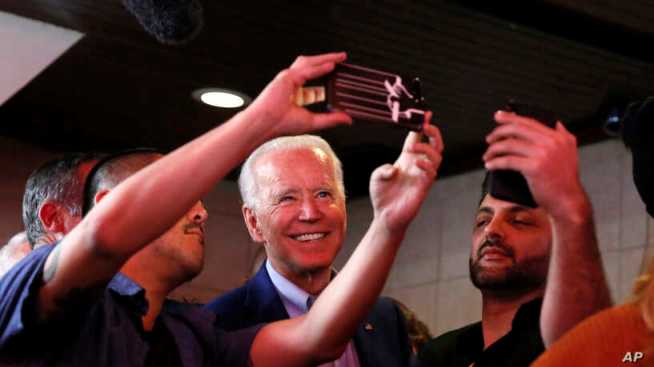Biden Wins 3 States, Sanders 1 in First Super Tuesday Results

U.S. Democratic presidential candidate and former Vice President Joe Biden takes selfies with customers at Roscoe’s Chicken and Waffles as he campaigns before his evening rally on Super Tuesday in Los Angeles, California, U.S., March 3, 2020. REUTERS/Elizabeth Frantz – HP1EG3403GI6P
VOA News By Ken Bredemeier
WASHINGTON – Former U.S. Vice President Joe Biden won three states — Virginia, North Carolina and Alabama — while Senator Bernie Sanders captured his home state of Vermont in the first results from Tuesday’s Democratic presidential nominating contests in 14 states.
Biden’s victories, projected by cable television networks as the polls closed in the early evening, were his third and fourth in four days, after his resounding win in South Carolina Saturday that was forged with robust support from African American voters.
Sanders, a self-declared democratic socialist, had been widely expected to win his small Northeastern state.

Sixty-three percent of black voters in Virginia supported Biden, compared to only 18% for Sanders and 10% for former New York Mayor Michael Bloomberg, according to CNN exit polling. On the question of which candidate was best equipped to defeat Republican President Donald Trump in November’s national election, 58% picked Biden, compared to 19% for Sanders and 11% for Bloomberg. Exit polling in North Carolina showed similar overwhelming African American support for Biden and confidence that he would be best able to topple Trump.
Voting was spread across the United States Tuesday, the single biggest day of balloting in the race to pick a Democratic nominee to oppose Trump.
Last month’s contests in Iowa, New Hampshire, Nevada and South Carolina were conducted on different days. But the 14 states voting Tuesday spanned the U.S. from coast to coast and presented the candidates with a wide mix of diverse voters, from more liberal bastions in Vermont and Massachusetts, to conservative enclaves in Alabama, Tennessee and Texas, and to the polyglot Pacific coastal state of California, with its heavy Hispanic vote.
According to pre-election polling, Sanders was expected to win the largest share of the delegates Tuesday to the party’s national convention in July, particularly if he does well in California, the country’s biggest state, which alone controls a fifth of the delegates to the quadrennial conclave.
In all, a third of the national convention delegates are being picked Tuesday.
But Sanders faces stiff competition in several states from Biden, who after the South Carolina vote, was later endorsed by former South Bend, Indiana, Mayor Pete Buttigieg, Minnesota Sen. Amy Klobuchar, and former Congressman Beto O’Rourke — three of his opponents who dropped out of the race.

Sanders and Biden also face stiff competition from two other contenders, Massachusetts Sen. Elizabeth Warren, a one-time Harvard law professor, and Bloomberg, who has spent more than $500 million of his personal fortune funding his presidential campaign.
Bloomberg is entered in his first party contests after choosing to skip the first four in February.
The states of Arkansas, Colorado, Maine, Minnesota, Oklahoma and Utah also are voting, along with the U.S. territory of American Samoa and Democrats living abroad. Bloomberg won the six delegates from American Samoa, CNN projected.
In CNN exit polls, voters in both Virginia and North Carolina widely said it was more important for them to pick a candidate who could beat Trump rather than to find a presidential choice who agreed with them on issues.
In Alabama, Maine and North Carolina, voters said their overwhelming feeling about the presidential race is that they are angry at Trump, not just dissatisfied with his performance.
Pre-election polls showed Biden winning the most Super Tuesday states, but with Sanders winning the all-important delegate count for the day, largely because of California.

A total of 1,991 delegates to the national convention is needed to secure the party’s presidential nomination. No candidate is anywhere close to that number after the voting in the four early states, but Sanders began the day with 60 delegates over Biden’s 53.
Delegates to the national convention are awarded state by state on a proportional basis according to the vote count in each state’s primary election, but candidates have to clear a 15% vote threshold in order to win any delegates in states as a whole or in individual congressional districts.
The key question in California is whether any of Sanders’ challengers clears the 15% threshold to keep him from winning a massive haul of national convention delegates. Pre-election polls also show Sanders doing well in the second-biggest prize of the day, in the Southwestern state of Texas, with Biden ahead in smaller states with a fewer number of delegates at stake.
Bloomberg has advertised heavily in the Super Tuesday states, but his halting performance and controversy over his tenure as mayor and as a business tycoon in two nationally televised debates raised questions about whether he would be able to amass wide voter support.
Warren once was near the top of Democratic favorites for the party’s presidential nomination, but she has yet to win a state nominating contest, and could even lose her home state of Massachusetts to Sanders Tuesday.
She is hoping to win the nomination at a brokered national convention with no candidate clinching the nomination ahead of time, which has not occurred since 1952.

Trump has commented almost daily about the Democratic race, dishing out negative nicknames to all of his would-be Democratic opponents, calling Sanders «Crazy Bernie,» Biden «Sleepy Joe» and Bloomberg «Mini Mike» for his short stature.
The president said Tuesday he would gladly debate any of the Democrats in the weeks before the Nov. 3 election, when the party’s nominee has been selected.
“Whoever it is, I don’t care. We’ll take them on,” Trump told reporters. “I’ll debate any of them, gladly. Very gladly.”
He said there is «no question the Democratic establishment is trying to take it away from Sanders. No question in my mind.”

